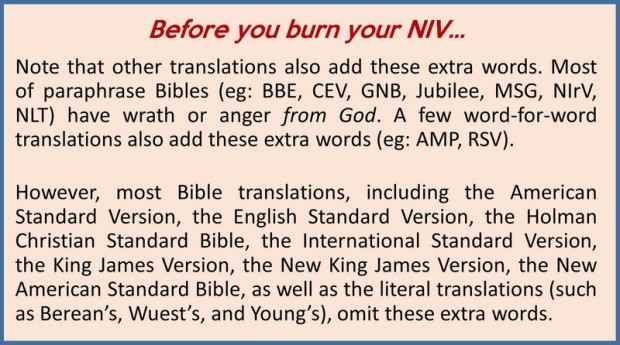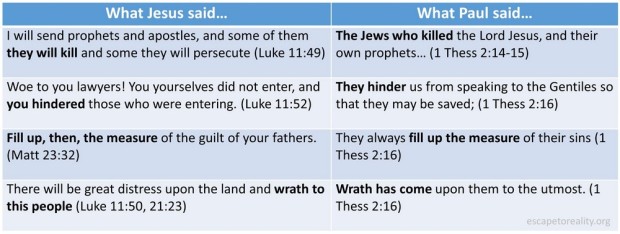Whose Wrath has Come? (1 Thessalonians 2:16)

(The Jews) killed the Lord Jesus and the prophets and also drove us out. They displease God and are hostile to everyone… they always heap up their sins to the limit. The wrath of God has come upon them at last. (1 Thessalonians 2:15-16, NIV)
This sounds like something you might read in the Old Testament yet it’s found in the New. It’s out of place. And it’s almost certainly a reference to the siege of Jerusalem. “Those troublesome Jews are sowing the wind and are about to reap the whirlwind,” says Paul. “The wrath of God has come on them at last!”
Except it hasn’t.
Paul never says this.
Instead, he says, “The wrath has come.” Not the wrath of God, just the wrath.
Certainly the addition of those two little words of God fits the vindictive theology that many of us have grown up with, but they’re not in the Bible. They were added by the translators who wrote the New International Version. Not for the first time the NIV editors have put their own dark spin on God’s word.

Here’s how the phrase appears in Young’s Literal Translation: “the anger did come upon them – to the end!”
“Sheesh, Paul. You’re getting worked up over two little words. Does it even matter whether the wrath is of God? It’s still wrath.”
Does it matter?! Well considering the NIV is arguably the world’s most popular Bible, with 450 million copies in print, I think it does. That’s nearly half a billion people who have been led to believe that the Bible says the Jews fell under the wrath of God when it doesn’t.
The NIV: “God smashed the Jews.”
The Apostle Paul: “Wait, what? I never said that.”
The NIV: “But that’s what you meant. Right?”
The Apostle John: “Oooh, you’ve been adding words to the Bible. You naughty!”
It’s one thing to interpret the Bible wrongly; it’s a whole other thing to add words to the scriptures to support your wrong interpretation. Paul never said a peep about the wrath of God. He was referring to Roman wrath.
Roman’s bad; God good. See the difference?
“Wait a sec. Paul wrote his letter in AD51. Why does he say the wrath has come when the Romans were still 15-20 years away?”
Because he’s quoting Jesus. When Paul speaks of persecution, wrath, and killing he uses the exact same words Jesus used when prophesying about the days of vengeance. See for yourself:
The religious Jews had been murdering the prophets for centuries but Jesus said their time was up. Enough was enough. Their sins had heaped up and this generation would reap the wrathful harvest. So when Paul says “the wrath has come,” he is simply repeating what Jesus has said.
The wrath that has come was not divine punishment. Don’t let anyone tell you that God killed the Jews in AD70. The wrath of which Jesus and Paul spoke was the wages of the Jews’ heaped-up sins. After centuries of sowing hatred and violence, they were about to reap a wrathful harvest.
Sin bears bad fruit all of its own. Aggravate your boss and you may get fired. Cheat on your wife and she may divorce you. Murder those who seek to bring you peace and you may reap war.
This has nothing to do with God and everything to do with sowing and reaping.
“But doesn’t the Bible say elsewhere that there is wrath for those who reject Jesus?” Yes, but that is a different kind of wrath. It’s righteous wrath from a just God as opposed to state-sanctioned massacres dealt out by blood-thirsty legions.
If there is wrath for the Jew who rejects Jesus, it is the same wrath for the Gentile, and it is not dispensed by Romans, Nazis or any human agent.
Get your view of God from the Old Testament or badly-translated scriptures and you may think that God punished the Jews for killing his Son. This is a perversion of the gospel and a distortion of history.
The gospel declares that Jesus died for the Jews, not the other way around.
___________
Adapted from chapter 23 of Paul’s new book AD70 and the End of the World.



ὀργή τοῦ θεοῦ is in some manuscripts (D, F, G etc), so it’s perhaps going too far to say that the NIV editors added it to the bible, at least without qualification.
Andrew
Perhaps I pick on the NIV too much, but someone added it to the Bible and the NIV, along with some other translations, erred in deciding to reproduce that additional text. It’s fair to say that the popular NIV has done more to perpetuate this error than any other translation.
Revelation after revelation thank you.
In both examples…your boss or you wife…SOMEONE has to bring the wrath, right! Everyone knows it was the Romans in 70ad….but did God ORDAIN it? Is God sovereign or is man?
Nero ordained it. Nero is not God. Nero was an incestuous, Christian-murdering psychopath. God is good.
what about the parable of the wedding banquet in matt 22? it is the king who represents God who sends his army to destroy and burn the city.
It’s one of my favorite parables. What about it?
Yes Nero ordained and God is good. Why didn’t He stop it? Wouldn’t you step in and stop someone from murdering your kids. This is a genuine question ‘ the kind that unbelievers ask. I would like to respond to them
You might as well ask why God didn’t stop Domitian, Attila the Hun, Genghiz Khan, Covid, the Asian Tsunami, or the Black Plague.
Yes. Why didn’t He? Was it because of lack of prayer by a “righteous man”
I have to agree with you Paul. The NIV is in my opinion the worst bible one could own or look to. It’s guilty of many words added or meanings changed if one were to look it up. I constantly look between my NASB, ESV and I look to my KJB as the authority although those translators added words as well. For instance Romans 8:1 in the Greek says Therefore there is now no condemnation for those in Christ. ( period) no comma , for those who walk according to the spirit and not after the flesh. Also KJV says faith comes by hearing and hearing the word of God. The Greek word is Christos. It’s the word of Christ that brings faith as we know the entire word of God can actually depress you until you hear of Christ. But being that Christ is God I let that one slide lol
Excellent word. Thank you for bringing much needed clarity on these scripture verses and the word ‘wrath’. Amazing!
Thinking of a righteous wrath from a just God as opposed to state-sanctioned massacres dealt out by blood-thirsty legions. It’s extremely wow paul, thenks.
Good on you Paul ! Keep those revelations of truth coming! God is awesome!
Having read a few books on the times in which Jesus walked the earth, I noticed at least two times where declaring you were the Messiah to the Jews was punishable by death by stoning, not crucifixion. If so, then the Romans, not the Jews, had Our Lord crucified. The Jews certainly did not object, but it was a Roman order that happened. Help!
If sin was nailed to the cross in the body of Jesus, why would God’s wrath be carried out against a human being?
Because the person did not receive Christ as his atonement. Without accepting the provided sacrifice, the guilt remains and the condemnation is just.
It’s true we don’t receive His life unless we want it, but He did demonstrate His love for all at the cross. The God who is the same yesterday, today, and forever does not change from unconditional love to fire and brimstone judgment of people from one chapter of the Bible to the next. When He executes judgement it is against that which brings death as is fitting for the God of life.
Yes God is the same. But God cannot save, and protect the guilty at the expense of His righteousness. The soul that sin shall die. That is why Jesus has to go to the cross to save us. If we reject His provision of protection and salvation, God will not force it on us. That is why the cross is so beautiful, it is there that both His love and righteousness is revealed!
Wow! I look forward to your new book with great anticipation! Excellent post! Thanks for sharing these enticing previews
Brill stuff Paul! 🌟🌟🌟🌟🌟
I have to respectfully decline much of this. Why? Because “good” is sometimes not “nice”.
A good father will discipline his child. A good nation will punish it’s criminals.
Peter was clear that “good” is not always pleasant to endure, nor is love always soft.
Whether or not those verses were altered by the translators of the NIV is not my dispute and irrelevant. We can’t always interpret “good” as lacking “wrath” or a swift hand.
Jesus was not always so soft on people, namely His OWN people!
In AD70 the Romans crucified Jews, up to several hundred per day, until they ran out of wood. 600,000 bodies, dead from famine, were carried out of the city’s gates. This is the wrath we are speaking of here. You still think God was responsible?
God poured out his “wrath” against sin upon Jesus on the cross. How then could God have wrath left over for the “wicked” Jews if he already punished Jesus for it? Did God save out a tiny bit so he could destroy Jerusalem later? Then we have the people caught up in the “wrath” that were killed, maimed or displaced. Is God so unjust that he would not only double punish(Jesus + Jerusalem) for a sin but also punish those who had not committed it as well?
I believe the leaders did not receive Christ as their atonement for sin. Therefore is no other way for atonement. If one were to read Josephus’ record, it was terrible, the Jews were killing themselves even before the Romans came. They rebels spilled the high priest’s blood in the temple grounds. Carried out false trials against righteous persons. Without Christ we all go mad, not just the Jews. I believe in a way it was God’s judgment,
John- What you are describing is the natural result of sin and godlessness. Not God’s direct and purposeful judgement. Yes sin makes God fighting mad but even while we were disgusting rebels sinning our lives away Jesus bled out for us. 2 Cor 5:19 says God is not counting the trespasses of the world against them so they can have a chance at reconciliation.
Is God suffering from a split personality? Jesus wept for Jerusalem, knowing what was to come. So then the Father pours out a violent, vindictive wrath? It doesn’t make sense. Jesus is the exact representation of the Father. To see Jesus is to see the Father. God’s unending love for Israel is abundantly clear in the Old Testament. The Father would weep over Jerusalem as well.
I studied that weeping episode while researching my book. This was not the same sort of weeping Jesus did for his dead friend Lazarus. This was sobbing and wailing. Jesus was undone by the thought of what was coming to Jerusalem. He made a total scene about it.
Wow. I never realized that. And Jesus and the Father are one. So how could anyone think the Son and the Father were in such conflict? It would make the Godhead a house divided.
Paul, this posting is a perfect example of what I like about you. It’s like if you have a friend who’s a great guy and someone says “did you hear about this terrible thing that your friend did?” And instead of believing this junk about your friend you say – “well, this sure doesn’t sound like my friend. He is incapable of doing something like that. Maybe we should look into this a little bit closer.” So many people believe in a schizophrenic God, that they never know whether he will bless them or screw with them for some obscure reason. Thank you for speaking well of our Daddy. You do him honor the way you think of him.
Matthew 22. Parable of the Great Feast. The king sends his armies to destroy and burn the city.
Is God wrathful and vengeful? Yes
Is He good? Yes
I totally agree, but again, this has nothing to do with the destruction of Jerusalem. I know there are some who see parallels, but there are at least a dozen reasons why the story is not pointing to AD70. If the king in the story represents God, then the armies in the story represent the heavenly host (not Romans), and the wrath refers to the final Day of Wrath. Note that the king in the story utterly destroys his enemies. If God had destroyed the Jews, there would be no Jews. You don’t bounce back from God’s wrath. In the story some people spitefully mistreat the king’s slaves, invoking his wrath. The word used is hubrizō which is the same word used to describe what the Romans (not Jews) did to Jesus when they tortured him and the Gentiles (not Jews) did to Paul in Philippi. The Jews weren’t the only people mistreating the apostles.
There is so much more I could say about this wonderful parable. I have a chapter on it and meaning of the burning city in the new book.
Paul and Jesus were Jews ,apostale and son of God. If wrath fall on Jews it falls on all above is what you want to tell us.
Personally I draw a distinction between ‘the wrath of God’ and a God who is angry.The term ‘wrath of God’ appears in NT on several occasions. e.g. Eph 5.6 ‘…the wrath of God comes upon the sons of disobedience’. Wrath does come from God but this does not make God angry. God is Love.
Israel and the nation scattered remains a chosen people…the apple of His eye 🙂
I still have a hard time understanding the way God seeming changed from the Old testament to Jesus.
I have been told that the Old testament was written attributing good and evil to God, because people did not have the holy spirit to understand the devil, that they could not handle the devil, so that these verses were called “Hebraism”
Deu 32:39
See now that I, even I, am he, and there is no god with me: I kill, and I make alive; I wound, and I heal: neither is there any that can deliver out of my hand.
So how do we reconcile this with Jesus coming and not harming a broken reed?
Is it not that we can kill our selves by bucking God? Is it not the devil? The whole Old testament seems full of examples. Was all God’s wrath poured out on the cross and satisfied.
Is this Moses’ version of a figure of speech? I wish someone would weigh in on this please. I can see why people can believe God in the Old testament was evil and then bang a good God arrives. It should be better clarified.
July 2025. Yes, I am late to the party and that’s a nice bit about the wrath of the Romans versus the wrath of God coming on the Jews. But I still have an issue with wrath belonging to God- righteous wrath or not-
God is self-sufficient. He doesn’t need anyone to bow to Him or gratitude or respect or acknowledgment. Why would He waste time exacting vengeance on mere mortals? Perhaps those who do not accept Christ simply end up in a place where He is not – as a logical consequence – not by a deliberate act of vengeance on God’s part.